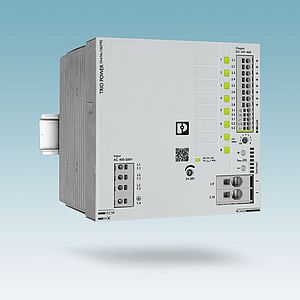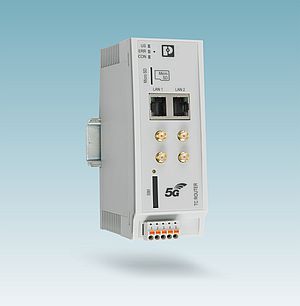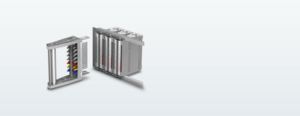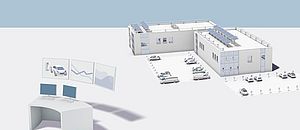Interview number 11 of our virtual round table: Dr. Frank Possel-Dölken, Vice President Corporate Technology and Value Chain, Phoenix Contact
IEN Europe: What are the main challenges when talking about digitalization? How to limit the side effects of the digital adoption?
Dr. F. Possel-Dölken: The main challenges of digitalization can be clustered in three groups. Within the company, it is important to reduce silo thinking, because digitalization also means taking a holistic view of corporate processes. The individual functional areas - engineering, mechanical engineering, production, purchasing, product marketing, sales, etc. - must think outside the box and work together on a solution. The previous way of working must therefore be changed. A digital mindset must be created.
With regard to business processes, it is necessary to create uniform data structures. The available data should therefore be as error-free as possible. The digital description of product data and processes, which must be founded on a uniform basis, makes a considerable contribution to this. It is adopted by the various functional areas and merely supplemented by their own information, which in turn is available to all participants. Digital descriptions are also a prerequisite for networking and digitizing business processes and value chains.
And, of course, employees must be involved in the digitalization strategy. Here it is important to enter into a dialogue and provide comprehensive information about the next steps as well as their necessity and effects, for example in order to reduce fears or identify opportunities. If new qualifications have to be acquired, employees should be encouraged to take part in further training and perspectives should be presented to them. And, of course, managers must reflect on their own role and adjust it if necessary.
IEN Europe: How much is digitalization part of your company’s strategy and why?
Dr. F. Possel-Dölken: Digitalization is an integral part of the corporate strategy and is firmly established within the framework of the Digital Vision. In principle, everything that Phoenix Contact does is supplemented by a digital dimension, if this makes sense. Projects of great radiance (lighthouses) and a learning effect expand our digital competencies. Phoenix Contact actively participates in the German Industry 4.0 platform. CTO Roland Bent, for example, is a member of the Industrial Strategy Development Steering Committee.
Digitalization/digital business models can not be stopped or ignored. The customer expects digitalization in his professional environment to the same extent as he knows it from his private life. At Phoenix Contact, great efforts are therefore made to support the change process regarding digitalization by means of communication and to incorporate it in the company, for example through workshops for managers and employees.
IEN Europe: Digital thread or digital threat? What’s your opinion?
Dr. F. Possel-Dölken: Like every coin, digitalization has two sides. On the one hand, there are promising opportunities, such as securing existing business, for example by increasing customer loyalty through the provision of digital value-added services. In addition, new fields of activity can be developed that generate additional revenue. The topic of predictive maintenance is often mentioned in this context: Manufacturers record the data of their globally installed devices in a cloud, evaluate it and on this basis can predict when maintenance should best take place.
On the other hand, it should not be forgotten that digitalization requires extensive investments. The functional maturity of existing IT solutions often proves to be insufficient. As a result, IT costs may be higher than estimated. And not every supposedly good new business idea, which is often associated with higher start-up financing, strikes the user as brilliant.
IEN Europe: What’s the role of IoT in today’s factory? Why is it so important to undertake the digital transition?
Dr. F. Possel-Dölken: Digitalization makes it possible for OT and IT to grow together. The networking of all processes in the value chain increases the productivity and flexibility of companies. Individual customer orders can thus be implemented in a more cost-neutral way.
The variety of automation applications is increasing. Therefore, customized products and solutions are also increasingly required. Automated business processes, integrated manufacturing processes and technologies as well as automatically generated product data are required to enable manufacturers to produce these products with short delivery times and the usual high quality.
The goal is one-batch flow, i.e. the production of different product variants without or with only minimal interruption of the manufacturing process, as well as production in exact quantities. Here, Phoenix Contact focuses on a varied flow production process using common lean principles. The aim is to simplify and accelerate logistical flows by means of systematic structuring and clocking. Furthermore, we want to increase the transparency of events and performance in order to be able to intervene in a more targeted manner. The third goal is to align production with the actual customer cycle, using forecasting methods and linking them to production planning.
Sara Ibrahim































